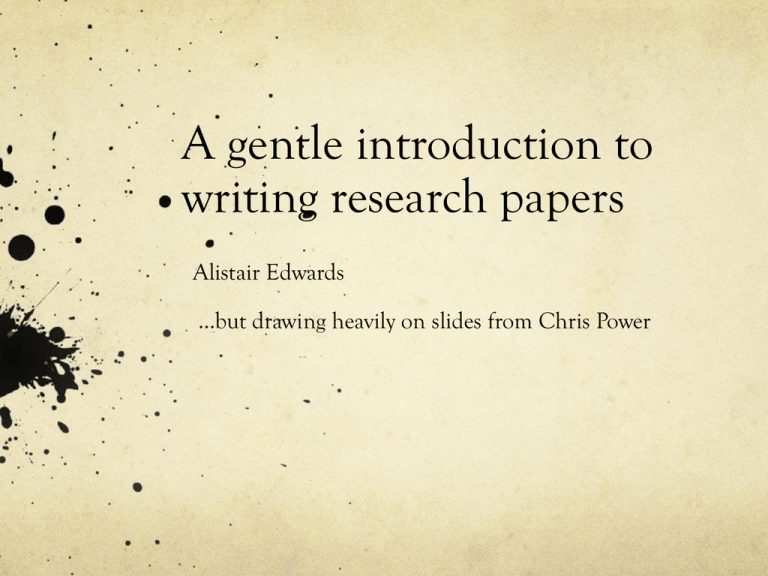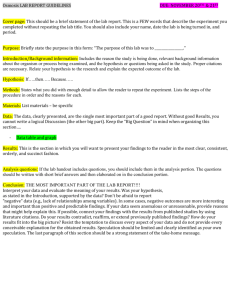A gentle introduction to Writing Research Papers
advertisement

A gentle introduction to writing research papers Alistair Edwards …but drawing heavily on slides from Chris Power Objectives To give a brief introduction to scientific writing in general To help you prepare for the specific writing task for the assessment of this module Why do we publish? (principled) As scientists we work at the forefront of our field, we have new insights into many topics in which we work We have an obligation to share our improved knowledge, about interaction or any topic, with others Peer-review self-selects the best work to be shared with the outside world forming a meritocracy Our work grants us immortality Why do we publish? (pragmatic) Publications help us communicate our message to other scientists to foster collaboration Publications give us ‘esteem’, which is a quality that allows you to influence decision makers Publications get us money in the form of grants and scholarships Publications grant us jobs ‘Publications get us money in the form of grants and scholarships’ Increasingly true All university departments are being assessed via the Research Excellence Framework (REF) This will depend to a large extent on bibliographic metrics of publications Publish a paper and get lots of people to cite it = £££££££ Why do we publish? ‘Publish or perish’ Your writing tasks Formative assessment Weeks 4 - 8 Group writing on a given topic Peer reviewed Module assessment Spring 7 – Summer 1 Individual writing on a negotiated title Individual project Report Paper Organizing your research (paper) Organizing your research (paper) Choosing a topic Choosing your audience What is your hypothesis? What is your story? Doing your literature review Finding your evidence Choosing a topic One key to success is – What are you going to research? …but in the context of your assessments you will have to negotiate your topic Think of your audience Formative exercise? Module assessment? Project report? Project paper? What is your hypothesis? A classic scientific paper is based on a hypothesis A hypothesis is a proposition Your objective is to prove – or falsify – that hypothesis (QUAN) Example hypotheses Animation makes web advertising more effective Fast-tempo music increases game players’ sense of immersion Perceived ease-of-use is positively related to flow experience of playing of an on-line game Data entry by older users is easier when the pocket computer has a keyboard, albeit a small one The null hypothesis The negation of the hypothesis Seek to prove it Fail and you have supported the hypothesis e.g. Perceived ease-of-use is not positively related to flow experience of playing an on-line game Even a review paper may have a hypothesis Find a point to argue and do so with reference to the literature What is your story? Every paper has a story Finding it can be hard but once you are clear you can write a clearer paper ‘No tale is so good that it can’t be spoiled in the telling’ (Proverb) Example stories ‘This is my hypothesis and here is the evidence to support or refute it’ A history Selling an idea a product Teach start from what the reader knows and lead them to new knowledge Doing your literature review There is always a literature review Your assessment paper will be mostly a literature review What’s your story? Structuring your paper You then have to communicate all of the above to your reader Build constructs of language – sentence to paragraph, paragraphs to sections, sections to papers All constructs of our paper will have the same structure: Introduction – orienting the reader Contribution – the point of the construct Conclusion – sending the reader off Structuring your paper Title Abstract Introduction Contribution Conclusion References Acknowledgements Structuring your paper Contribution Generally Method Results Discussion Structuring your paper Contribution Show reasoned judgement Do not express opinions Structuring your paper Title Abstract Introduction Contribution Conclusion References Acknowledgements Structuring your paper Introduction Contribution For the assessment mainly discussion Conclusion Abstract Abstract: State the contribution you are making State the motivation as to why it is interesting State the methodology you followed State the results State the conclusions You get about 1-2 sentences for each of these The abstract will keep people reading your paper if it is likely to be useful to them Abstract Abstract: State the contribution you are making State the motivation as to why it is interesting State the methodology you followed State the results State the conclusions You get about 1-2 sentences for each of these The abstract will keep people reading your paper if it is likely to be useful to them Abstract The abstract and paper should be capable of being read independently Don’t assume that the reader reading one of them has read the other A good abstract? Introduction Introduce the topic ‘This paper is about…’ very early on ‘No one reads the second paragraph’ Journalists’ dogma Introduce the background Introduce the paper Literature review In this section you will convince the reader that what you are doing is new and interesting Hit on major themes within the research community Look for problem areas such as common disagreements or ‘dogma’ that is in the field so that you reference them clearly This is particularly important in your assessment You have not simply read the literature, you have analysed it critically Discussion section? Conclusions Simple rule Introduce nothing new in the conclusions It is a distillation of what has gone before Not a summary of the paper A summary of what can be learned from it Conclusions State – or re-iterate – succinctly: The contribution you have made The motivation as to why it is interesting to your audience and how it applies to them The methodology you already described The key results What the findings mean to the field and how it is original and important Sources of information Zobel Writing for Computer Science http://www.amazon.com/Writing-Computer-Science-Justin-Zobel/dp/1852338024 Strunk and White (2014) Elements of Style, CreateSpace Independent Publishing Platform Mander K. (1994) Writing for Humans http://www.cs.york.ac.uk/tutorials/writingforhumans.html Sources of information How to Write a Great Research Paper http://www.youtube.com/watch?v=g3dkRsTqdDA Video (34:25) by Simon Peyton Jones Thimbleby, H (2008) Write now!, (in) Cairns. P & Cox, A. (eds.) Research Methods for Human-Computer Interaction, Cambridge University press, pp.196-211 Pinker, S (2014) Why Academics Stink at Writing, The Chronicle of Higher Education Read literature critically for style - re-read papers, chapters that you found easy to read Sources of information Truss, L. (2003) Eats shoots and leaves: The Zero Tolerance Approach to Punctuation Profile Books Burchfield, R. W (2004) Fowler's Modern English Usage Oxford University Press How to Write an Abstract by Philip Koopman, Carnegie Mellon University http://www.ece.cmu.edu/~koopman/essays/abstract.html Sources of information Academic phrasebook http://www.phrasebank.manchester.ac.uk/ Exercise Instructions Groups of 2 – 3 Consult your tutor






